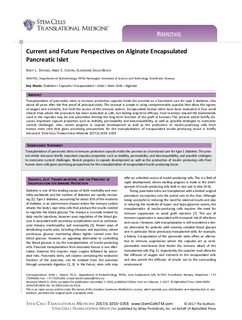Current and Future Perspectives on Alginate Encapsulated Pancreatic Islet
Journal article, Peer reviewed
Published version
Permanent lenke
http://hdl.handle.net/11250/2468104Utgivelsesdato
2017Metadata
Vis full innførselSamlinger
Sammendrag
Transplantation of pancreatic islets in immune protective capsules holds the promise as a functional cure for type 1 diabetes, also about 40 years after the first proof of principal study. The concept is simple in using semipermeable capsules that allow the ingress of oxygen and nutrients, but limit the access of the immune system. Encapsulated human islets have been evaluated in four small clinical trials where the procedure has been evaluated as safe, but lacking long-term efficacy. Host reactions toward the biomaterials used in the capsules may be one parameter limiting the long-term function of the graft in humans. The present article briefly discusses important capsule properties such as stability, permeability and biocompatibility, as well as possible strategies to overcome current challenges. Also, recent progress in capsule development as well as the production of insulin-producing cells from human stem cells that gives promising perspectives for the transplantation of encapsulated insulin-producing tissue is briefly discussed.

